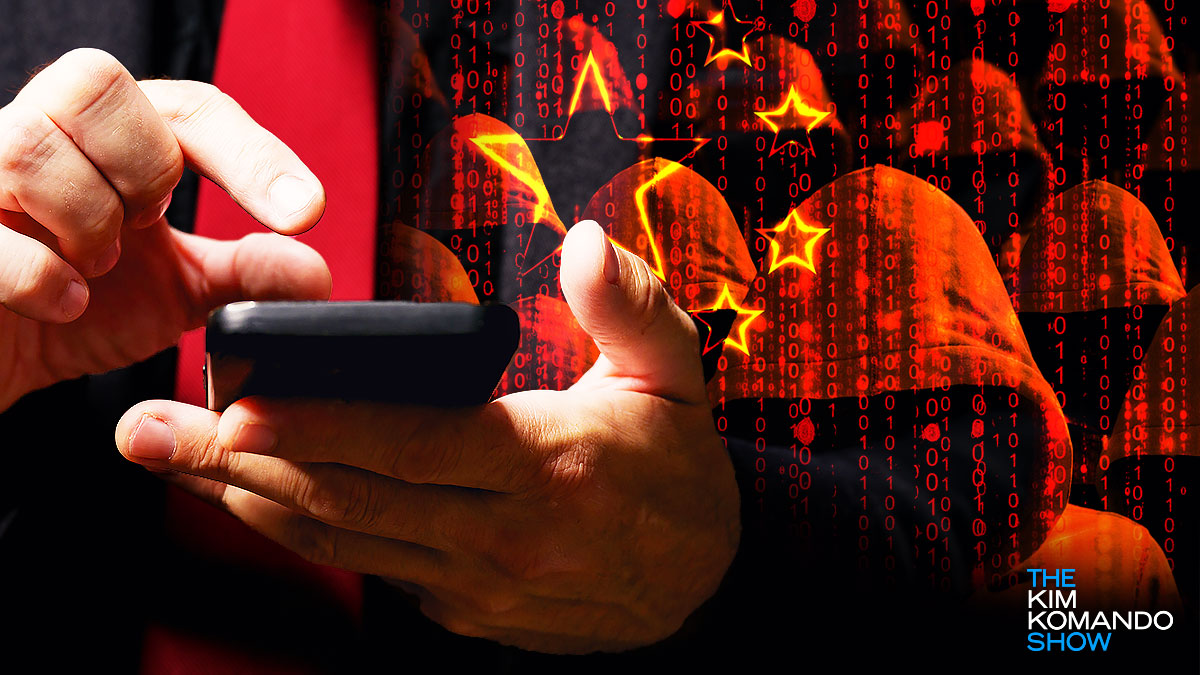Stalkerware is up 239%: Apps like mSpy and Life360 market themselves as ways to track your kids. Abusers use them to see everywhere their partner goes. This is no small problem; 85% of domestic violence survivors have experienced digital abuse. Need help? Here’s my guide to protecting yourself.
Keep hackers out of your online life

Cybercriminals never stop coming up with ways to steal your info, so I’m always on the hunt for tools that make your digital life safer. One of their sneakiest tricks? Keyloggers.
Keyloggers secretly record every single thing you type — passwords, credit card numbers, private messages, you name it. They send your info straight to the person controlling the malware, giving them a backstage pass to your life.
That’s not all you have to worry about. Espionage attempts from foreign countries are on the rise. After China hacked U.S. telecom companies, the FBI put out a warning that regular text messages aren’t safe anymore.
So, what’s the solution?
EndpointLock. Think of it as a digital bodyguard for your keyboard. Its patented Keystroke Transport Layer Security technology creates a secure, encrypted pathway for your keystrokes.
Every single key you press is encrypted, or scrambled into gibberish hackers can’t decipher. Even if keylogging malware makes it onto your device, it won’t matter — they’ll see nothing but nonsense.
EndpointLock works quietly in the background. Whether you’re logging into your bank account, shopping online or sending an email, your data stays safe without any extra hassle or steps.
What does EndpointLock protect?
- Messages: Shield every message you send on every app.
- Accounts: Lock down your logins for banking, email, social media and more.
- Shopping: Safeguard your credit card and personal info when making purchases.
- Emails: Keep your private conversations truly private.
- Identity: Stop identity theft before it happens by securing your most sensitive data.
And here’s something I love: EndpointLock is 100% USA-owned.
Stop waiting to take charge
With one plan, you can protect up to eight devices, including Windows PCs, Android devices, and iPhones. You can share that with family, too.
The crypto investment scam that’s all over social media

I’m all about using AI to get stuff done. No kidding, I use ChatGPT every day to shortcut planning and organize my work and my life.
You know who else loves AI? Cybercriminals. A new scam powered by deepfakes is all over social media. Too many people have fallen for it and lost millions of dollars in the process. I’ve got the dirty details so you don’t become a victim, too.
7 days
To regain access to your Gmail account after it’s been hacked. Google says you have a week to enter the phone number connected to the account or it may be gone forever. Now, make sure your recovery number is set up correctly.
Retailers have so many ways to track you – Here’s how to fight back

If you have a pulse and an internet connection, companies want all the details they can get about what you’re willing to buy. Now that your holiday shopping is done, it’s time to take back control.
There’s a bit of work you can do and then to reclaim your privacy, but if you’re looking for a longer-term solution, I’ll share my secret weapon in the fight against tracking.
Bank fraud is rising – How to protect yourself

The scams don’t stop — and here’s another one you need to know about. Your phone rings. It’s a rep from your bank, and they’re warning your account has been compromised. You’re smart, so you immediately suspect it’s a scam.
Attn., Windows Insiders: Microsoft’s Recall feature is a privacy nightmare. Even after a backlash forced changes, Recall still captures info like credit cards and Social Security numbers. That’s with the “sensitive info filter” on. Microsoft says they’re fixing it. Again.
Microsoft’s very bad advice: Some 240 million active PCs are too old to update to Windows 11. After years of telling us otherwise, Microsoft now says you can go ahead and update your incompatible PC. The big disclaimer: Your computer might not get every security patch and update, so it’s not worth the risk.
🍩 Krispy Kreme’s security hole: The doughnut giant’s fessing up about a Nov. 29 security breach that took down its online ordering system in parts of the U.S. Along with your credit card details, it’s a safe bet your deep, dark secrets (like how many times you bought a doughnut on the way to work) were leaked, too. Sing it with me: “Doughnut go breaking my heart. I couldn’t if I fried.” Yeah, that was bad.
You can’t dodge facial recognition: I thought this was super interesting. A hat, mustache and sunglasses used to be enough, but not anymore. The same goes for wearing a mask. AI is now trained to detect your eye shape. That’s all it takes.
Heads-up, Apple shoppers: Scammers are walking into Apple Stores with fake IDs and QR codes to steal laptops before the real buyers show up. It’s not quite clear how the shysters are getting the intel, so keep an eye on your order status and pick up your new tech ASAP.
I’ve warned you about this: SIM-swapping scams are brutal. Ask Justin Chan from Carlsbad, California. Someone took control of his phone number and then his bank account. They stole $38,000 he’d saved to help his mom. Bank of America denied his fraud claim. Safety step: Call your cell provider and request a PIN on your account right now.
Patch your PC pronto: It’s Microsoft’s Patch Tuesday, the second Tuesday of every month when they clean up bugs and flaws that put you at risk. Go to Start > Settings > Update & Security > Windows Update and hit Check for updates.
No more green bubbles … kinda: Apple’s upcoming iOS 18.2 update for iPhones ends the blue-versus-green speech bubble dilemma. Blue bubbles have always meant secure iMessage chats (iPhone to iPhone), whereas green bubbles lacked end-to-end encryption (Android to iPhone). Now, you’ll be able to set third-party apps like WhatsApp or Signal as your default encrypted messenger.
🚨 Watch out for these numbers: Fraudsters are using local area codes to gain your trust and steal your personal info. The most popular ones include 720 (Colorado), 272 (Pennsylvania), 959 (Connecticut) and 346 (Texas). The three most identified numbers were (763) 274-3899, (217) 402-1312 and (202) 456-1111. Calls from these numbers are usually banking scams. If you get one, hang up and contact your bank directly.
🏠 We have Fort Knox at home: Facial recognition and 3D surveillance are just the first steps for Silicon Valley tech elites turning their homes into military-grade fortresses. The startup Sauron (named after the villain in “The Lord of the Rings”) uses drones to create a “deterrence pod” that projects a searchlight to scare off trespassers. Boy, I could’ve used that when Chilean gangs targeted my home and the Phoenix SWAT team saved the day.
Biggest hack in US history: How to encrypt your communications

I’ve been talking about it for weeks, and now it’s all over the news: Communist Chinese hackers infiltrated telecommunications giants like AT&T and Verizon and wormed their way into government surveillance systems. The massive breach was detected over a month ago, but it’s been going on for over a year.
The FBI is sounding the alarm: I’ve been saying this for years: For sensitive convos, always use end-to-end encrypted apps. It took a massive telecom cyberattack from Communist China for the Feds to say it. Signal, WhatsApp, Google Messages and iMessage work for both calls and texts. PSA: RCS messages between iPhones and Androids aren’t encrypted.
🏴☠ Hands off my treasure: Porch piracy is so out of control, you can now pay for stolen package insurance. PorchPals covers up to $2,000 of deliveries (or three claims a year) for $120 annually. Don’t bother. Save your money. Sign for your packages or have them delivered to a locker. Steps here!
Un-bell-ievable: The FCC is slapping Chinese video doorbell maker Eken with a $735,000 fine. Sold by big names like Amazon and Walmart, Eken’s doorbells exposed users’ IP addresses and Wi-Fi network names and gave others unauthorized access to videos.
